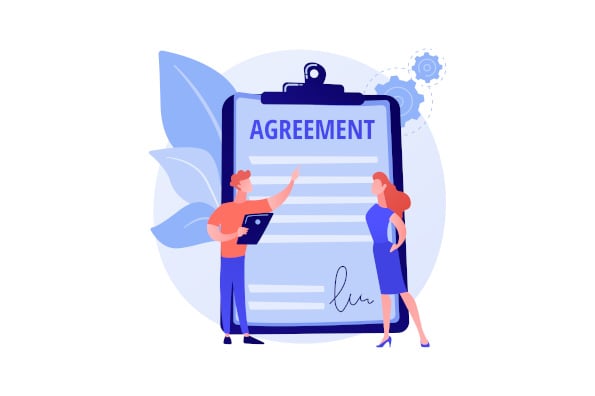Payment Structures for Band Performances: Contract Terms That Protect Artists
Getting paid as a musician isn’t always as simple as playing a gig and collecting your money. Many bands struggle with late payments, last-minute...
5 min read
LegalGPS : Apr. 2, 2025
Playing music is about passion, but getting paid for it is about business. Many bands rely on handshake deals, text message confirmations, or email agreements, assuming that venues and event organizers will hold up their end of the bargain. Unfortunately, that’s not always the case.
This guide breaks down the most common legal disasters bands face when performing without a contract—and how to protect yourself from these costly mistakes.


Legal GPS Pro
Protect your business with our complete legal subscription service, designed by top startup attorneys.
A band books a bar gig based on a verbal agreement that they will receive a percentage of ticket sales. After playing a packed house, they go to collect their payment, only to hear:
With no written agreement to prove what was promised, the band has no legal recourse and walks away with little or no money.
To prevent getting stiffed after a gig, your contract should:
Sample Provision:
"The band will receive 40% of total ticket sales after taxes. No additional expenses (advertising, staffing, security) may be deducted from this amount unless specified in writing before the performance."
This ensures the venue can’t make last-minute excuses and guarantees the band gets fair compensation for their work.
A band books a high-profile Friday night gig at a well-known club. Since they’re locked in for that date, they turn down other offers. Two days before the show, the venue calls and says:
The band is left with no gig, no payment, and no time to book another show.
Your contract should include a deposit and a cancellation clause to protect your band from financial loss.
Sample Provision:
"If the Client cancels the performance within 7 days of the event, 50% of the total performance fee will be due. If canceled within 48 hours, 100% of the fee will be due."
This protects bands from getting bumped for more profitable acts and ensures they receive compensation for holding the date.
A band gets invited to perform at a music festival in another state. The festival organizer tells them:
The band assumes they’ll be compensated, so they pay for gas, hotels, and food out of pocket. After the performance, they ask about payment and are met with:
Now, the band not only played for free, but lost money on travel and lodging.
Travel-related costs should never be assumed—they should be clearly negotiated and documented in a contract.
Sample Provision:
"For performances requiring travel beyond a 50-mile radius, the Client agrees to cover all transportation, lodging, and meal expenses. If no travel reimbursement is provided, the agreed-upon performance fee will include a travel stipend of $200."
By addressing travel costs upfront, bands can avoid financial losses on out-of-town gigs.


Legal GPS Pro
Protect your business with our complete legal subscription service, designed by top startup attorneys.
A company offers a band a high-profile event opportunity—but there’s a catch:
The band agrees, hoping for future opportunities. They perform for free, but after the event:
The band spent hours rehearsing, traveling, and performing—only to walk away empty-handed.
While some exposure gigs may have value, they should always include written benefits to ensure real compensation beyond vague promises.
Sample Provision:
"In exchange for a performance at no charge, the Client agrees to book the band for a paid event within 60 days at a minimum rate of $500. Failure to do so will require the Client to compensate the band $500 for the original performance."
With this clause, bands can hold organizers accountable if they fail to provide the promised opportunities.
A band is booked for a two-hour set at a local venue. Everything seems fine until, toward the end of the show, the venue owner approaches them:
Wanting to keep a good relationship with the venue, the band agrees. They play for an extra hour, but when it’s time to collect their pay:
Bands should never assume they’ll be compensated for overtime unless it’s explicitly stated in the contract.
Sample Provision:
"The agreed performance duration is 2 hours. Any additional time requested by the Client will be billed at a rate of $150 per additional 30 minutes, payable immediately before the extension begins."
This ensures that if a venue wants extra time, they must pay for it on the spot.
Many bands assume that verbal agreements or handshake deals will hold up—but without a contract, musicians risk:
A simple written contract can eliminate these risks by ensuring:
Bands work too hard to risk financial losses due to vague agreements. If you need a custom band performance contract template, check out our band performance contract template to ensure every gig is legally protected and fairly paid.
The biggest question now is, "Do I need a lawyer for this?” For most businesses and in most cases, you might not need a lawyer for simple contract issues. Instead, many business owners rely on Legal GPS Pro to help with their legal needs.
Legal GPS Pro is your All-In-One Legal Toolkit for Businesses. Developed by top startup attorneys, Pro gives you access to 100+ expertly crafted templates including operating agreements, NDAs, and service agreements, and an interactive platform. All designed to protect your company and set it up for lasting success.

Legal GPS Pro
Protect your business with our complete legal subscription service, designed by top startup attorneys.

100+ legal templates, guides, and expert advice to protect your business.
Trusted by 1000+ businesses
Table of Contents

Getting paid as a musician isn’t always as simple as playing a gig and collecting your money. Many bands struggle with late payments, last-minute...

A bad management agreement can be a business owner's worst nightmare—locking you into high fees, giving away too much control, or tying you up in a...

When you're in the catering business, you quickly realize that every event is different, and success depends on meeting various expectations. That's...